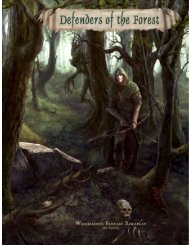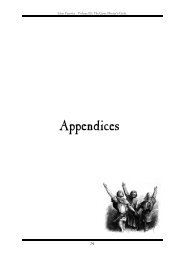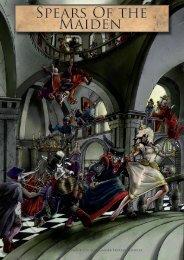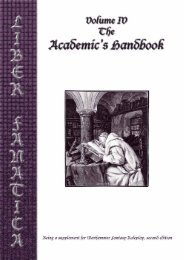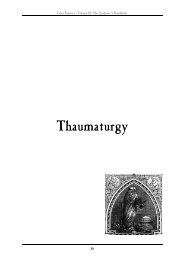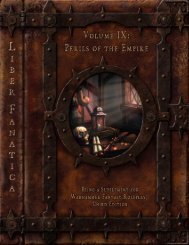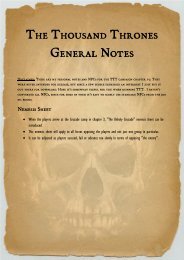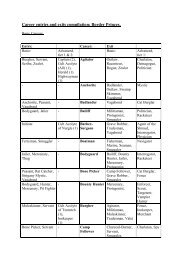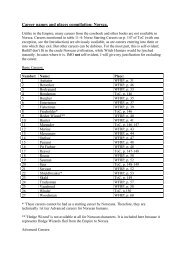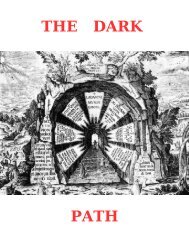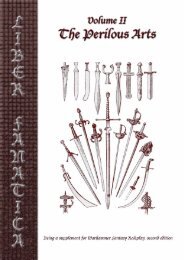Download Here (5.27 MB) - Liber Fanatica
Download Here (5.27 MB) - Liber Fanatica
Download Here (5.27 MB) - Liber Fanatica
Create successful ePaper yourself
Turn your PDF publications into a flip-book with our unique Google optimized e-Paper software.
<strong>Liber</strong> <strong>Fanatica</strong> - Volume III : The Game Master’s Guide<br />
Playtest<br />
If there is time before the convention, I strongly<br />
recommend that the scenario be playtested. If<br />
possible, one should use one’s own gaming group<br />
to play the pre-generated PCs in order to give the<br />
scenario a thorough run. Such effort should<br />
bring forth any holes in the plot and give the<br />
writer time to address these before convention<br />
play. If there is no opportunity for such, then I<br />
recommend having another GM read through it<br />
and provide some feedback.<br />
Conventions<br />
Getting a scenario a time slot in a convention is<br />
the easy part. If a convention offers preregistration,<br />
then they are also looking for GMs<br />
with games to run. One simply has to fill out the<br />
form with a description of the game and all the<br />
other requirements (such as number of players,<br />
game system, etc.). The description is the most<br />
important aspect as one has a limited number of<br />
words that can be used to entice players into<br />
one’s game. Be creative with the pitch, make it a<br />
bit mysterious, but don’t be misleading.<br />
One of the things I like to do when setting up for<br />
the sessions is to have the players select their<br />
characters blindly. To accomplish this, I<br />
generally place all character sheets face down<br />
and have the players roll to see who goes first.<br />
Highest roll selects the first character (and all<br />
choices are final), and then the next highest goes.<br />
Another way would be to list the careers of the<br />
characters and let the player with the highest roll<br />
choose based on that fact. The goal here is to not<br />
let players trade characters once selected. Who<br />
knows? A character might have a dark secret<br />
that she doesn’t want the others to know about.<br />
Once this part is done, I have the players create a<br />
name “tent” so they can have their character’s<br />
name in big letters up top with the player’s name<br />
in smaller print on the bottom. In this manner,<br />
players will know that heavily bearded Tom is<br />
actually playing a character named “Gerta.”<br />
When running the game, the important thing is<br />
for the GM and players to have fun. If the<br />
players are having a hard time making their dice<br />
rolls, the GM could add some modifiers to help<br />
out. Or, they could ignore having the players<br />
make a Listen test if the players have already<br />
declared that they are creeping along the forest<br />
floor listening for noises (or lack of same) that are<br />
out of place. In other words, the GM should not<br />
be a slave to the text of the scenario if the players<br />
are having an unusually hard time with it. In<br />
essence, the GM should allow good roleplaying to<br />
trump crappy dice rolls.<br />
If the GM wishes to improve their skills as either<br />
a writer (assuming he is running his own<br />
scenario) or GM, then it would be valuable to<br />
have some sort of survey prepared ahead of time<br />
to give the players a chance to comment on the<br />
scenario or GM skills. These should be short and<br />
take no longer than five minutes to fill out.<br />
Conclusion<br />
Writing and running convention scenarios can be<br />
very challenging and rewarding. It gives a GM a<br />
chance to test his skills as both a GM and writer<br />
and learn what areas he needs to improve on. A<br />
good portion of feedback comes from how well the<br />
players enjoy the game (and most will tell a GM<br />
when they’ve enjoyed the game). Feedback also<br />
comes from a GM’s reflection of how well he<br />
thought the game went. In the heat of running a<br />
game, it is natural for GMs to have played some<br />
parts less well than they had hoped to do.<br />
Perhaps, the GM allowed some parts to drag<br />
longer than they should or he didn’t rule a<br />
particular PC action as fairly as he would have<br />
liked. Or, it could be that the players found an<br />
overlooked flaw in the plotline that shortcircuited<br />
the scenario. Basically, there’s a<br />
number of lessons a GM could learn from<br />
running a game at a convention that they may<br />
not get in a setting with just friends.<br />
The main point is to make sure the writer/GM is<br />
having as much fun in the entire process as the<br />
players will have playing it.<br />
For examples of WFRP1 scenarios written for<br />
GenCon, one can go to www.MadAlfred.com and<br />
click on the Scenarios link. The scenarios at that<br />
site range from urban to rural and combinations<br />
in-between.<br />
18



